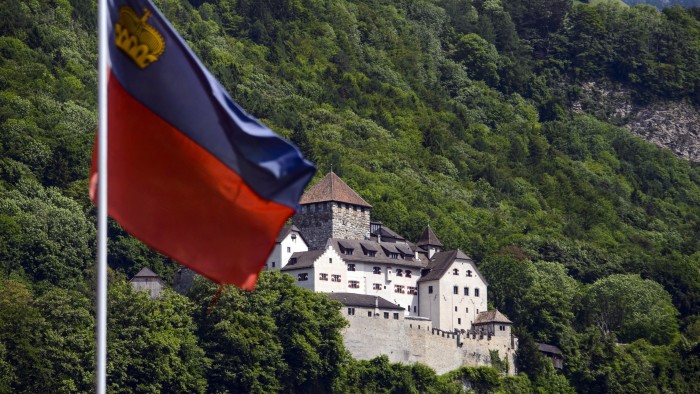Unlock the Editor’s Digest for free
Roula Khalaf, Editor of the FT, selects her favourite stories in this weekly newsletter.
Liechtenstein has launched an emergency task force to tackle a crisis of “zombie” trusts, which has left hundreds of entities linked to wealthy Russians in legal paralysis.
The tiny Alpine principality, a hub for thousands of trusts and foundations, has been hit by a wave of resignations by fiduciary and board directors in the past six months as its regulatory system adjusted to US sanctions packages against Russia.
The result could leave as many as 800 orphaned entities — legally recognised but functionally frozen — with nobody in charge to manage assets or oversee liquidation.
Bankers and lawyers have warned the crisis risks contagion into the country’s broader financial sector, including major banks, if the government does not address the problem.
“We are talking about multibillion-dollar floating zombie trusts. And there is no solution yet. I have never seen anything like it,” said one Vaduz-based lawyer whose clients include several of the affected trusts.
Liechtenstein adopted EU sanctions packages against Russia following the full scale invasion of Ukraine in 2022. Nonetheless in 2024, under the Biden administration, the US placed sanctions on several Liechtenstein-based entities and individuals owing to their associations with Russian individuals and activities.
The US also warned Liechtenstein as well as other European countries last year that it could impose secondary sanctions on foreign financial institutions that work with certain Russian clients — even if those clients are not individually sanctioned.
Fearing further US action, Liechtenstein’s Financial Market Authority (FMA) adopted a zero-tolerance approach, urging industry in September to treat US sanctions as in effect binding because they posed “existential” legal and reputational risks.
The FMA explicitly advised fiduciaries — a person or entity legally authorised to manage assets on behalf of others — to terminate relationships with exposed clients, saying it was “the only appropriate means” of risk control.
This prompted directors to resign en masse, said Helmut Schwärzler, a lawyer at Schwärzler Rechtsanwälte. He added the overlapping legal obligations, from foreign sanctions regimes and in Liechtenstein, have made it nearly impossible to find replacements for directors, he said.
The US actions have been “unexpected and that has caused panic”, said Schwärzler. “Even the authorities said we do not know what could happen tomorrow let alone in one or two months.”
“The vast majority of these entities are assets of non-sanctioned Russian people living in the south of France or Italy or places like Dubai. Even entities having just a remote link to Russia are affected.”
Government figures show 350 entities are in limbo pending regulatory deadlines and 40 of those are in early liquidation proceedings. The government has said 85 are orphaned because no liquidator can be appointed.
Officials and legal experts assisting with the delisting, civil litigation or attempts to reinstate fiduciary directors told the FT the number affected could eventually reach as much as 800 without a solution.
The opaque nature of the entities makes it difficult to estimate how much wealth connected to Russian people is frozen or stuck. The people said the trusts contain anything from $5mn in cash to billions of assets including yachts, aeroplanes, family offices and luxury properties.
There are fears the crisis will undermine Liechtenstein’s status as a financial hub. The tiny country’s vast trust industry is prized for its favourable tax and legal frameworks as well as its perceived ability to shield clients from geopolitical fallout.
“This is starting to be problematic for the Liechtenstein financial centre,” said MP Thomas Vogt in June.
The other looming danger if the situation is not resolved is Russia putting pressure on Liechtenstein, says Johannes Gasser, partner at Gasser Partner, one of the principality’s biggest law firms.
“There is a risk from the US but also from Russia now. This could become another unprecedented and unparalleled risk from the other side that is equally powerful,” he said.
Martin Alge, head of Liechtenstein’s Office of Justice, said the finance ministry and society and justice ministry have set up a steering group including the business sector to draw up options to tackle the “orphan” legal entities problem.
“The government knows how important it is to fix the issue. The department has been attempting to find liquidators and solutions such as appointing new boards, but the process has been difficult.”
He did not confirm the 800 figure but said it was “possible” that many could eventually be affected.
Separately the Liechtenstein government said it “accords the highest priority to a strong co-ordinated response to Russia’s ongoing aggression against Ukraine among our partners, including the US”.
The US Treasury said in a statement that it is co-operating with Liechtenstein authorities on illicit finance issues: “Treasury exchanges information and shares guidance with Liechtenstein on compliance with US sanctions and countering money laundering in its jurisdiction.”
Additional reporting by Claire Jones in Sintra




